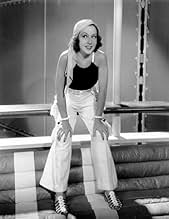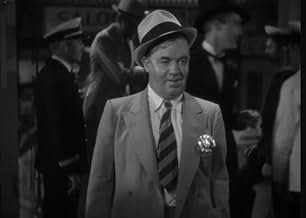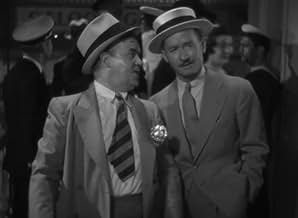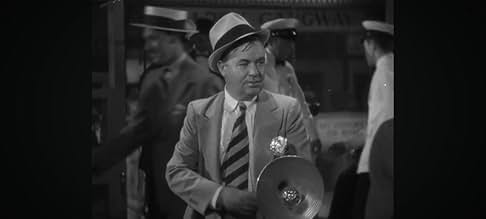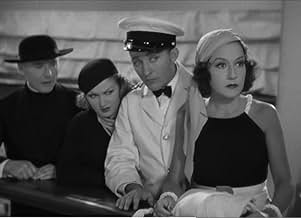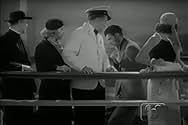Young man falls for blonde heiress forced onto ship. Follows to rescue her, disguising as mobster's aide when realizing she's returning home and his boss is aboard.Young man falls for blonde heiress forced onto ship. Follows to rescue her, disguising as mobster's aide when realizing she's returning home and his boss is aboard.Young man falls for blonde heiress forced onto ship. Follows to rescue her, disguising as mobster's aide when realizing she's returning home and his boss is aboard.
- Awards
- 3 wins total
Jack Adair
- Federal Man
- (uncredited)
Philip Ahn
- Ling
- (uncredited)
Featured reviews
The closest you'll ever come to hearing a faithful recording of Cole Porter's original score is by listening to the faithful 1988 studio cast recording directed by John McGlinn, which uses (as much as possible) the original orchestrations of Robert Russell Bennett and Hans Spialak.
However, that doesn't mean you should ignore this revamped film version, which has historical interest because it preserves one of the few film performances of Ethel Merman. The Broadway show, which opened in 1934 and ran for 420 performances (quite a long run in those days), actually gets better treatment than other Porter musicals adapted for film. I have in mind "DuBarry was a Lady," the 1943 vehicle that stars Lucille Ball, Gene Kelly and Red Skelton, and "Something for the Boys" (1944).
"Anthing Goes," which was renamed "Tops Is the Limit" to prevent confusion with the 1956 remake, again starring Bing Crosby, is more of a vehicle for Crosby than anyone else, which is why outside songwriters were brought in to provide him with material more suited to his vocal skills.
Only three of Porter's songs are given anything resembling a full treatment (albeit with laundered lyrics): "You're the Top," "I Get a Kick Out of You" and "There'll Alway Be a Lady Fair." Other songs are used as background or underscoring (e.g., "All Through the Night," "Blow, Gabriel, Blow.").
In the original cast, Merman was joined by two big Broadway stars -- William Gaxton and Victor Moore -- as well as a lady named Vivian Vance, while the film gives us, besides Crosby and Merman, Charles Ruggles, Ida Lupino and the veddy, veddy English Arthur Treacher.
The plot, such as it is, hardly matters. In her autobiography "Who Could Ask for Anything More," Ethel Merman tells why:
" ...the writers who used to think up the books that were wrapped around Gershwin or Cole Porter scores, started from scratch, which only their bare cupboards and an unmanageable sense of humor to guide them. First a producer signed a cast; then he hired writers to rustle up some material for that cast to use. 'I've got Bert Lahr,' he'd say. Or 'I've got Victor Moore. Get going' buddy. Make with the Moore-type yoks.' " In the mid-1950s, Merman and Frank Sinatra performed in "Anything Goes" on television. The program was later released on a bootleg album. If enjoy the film, with a little research you'll even find it on DVD.
Enjoy the hijinks, singing and production numbers.
However, that doesn't mean you should ignore this revamped film version, which has historical interest because it preserves one of the few film performances of Ethel Merman. The Broadway show, which opened in 1934 and ran for 420 performances (quite a long run in those days), actually gets better treatment than other Porter musicals adapted for film. I have in mind "DuBarry was a Lady," the 1943 vehicle that stars Lucille Ball, Gene Kelly and Red Skelton, and "Something for the Boys" (1944).
"Anthing Goes," which was renamed "Tops Is the Limit" to prevent confusion with the 1956 remake, again starring Bing Crosby, is more of a vehicle for Crosby than anyone else, which is why outside songwriters were brought in to provide him with material more suited to his vocal skills.
Only three of Porter's songs are given anything resembling a full treatment (albeit with laundered lyrics): "You're the Top," "I Get a Kick Out of You" and "There'll Alway Be a Lady Fair." Other songs are used as background or underscoring (e.g., "All Through the Night," "Blow, Gabriel, Blow.").
In the original cast, Merman was joined by two big Broadway stars -- William Gaxton and Victor Moore -- as well as a lady named Vivian Vance, while the film gives us, besides Crosby and Merman, Charles Ruggles, Ida Lupino and the veddy, veddy English Arthur Treacher.
The plot, such as it is, hardly matters. In her autobiography "Who Could Ask for Anything More," Ethel Merman tells why:
" ...the writers who used to think up the books that were wrapped around Gershwin or Cole Porter scores, started from scratch, which only their bare cupboards and an unmanageable sense of humor to guide them. First a producer signed a cast; then he hired writers to rustle up some material for that cast to use. 'I've got Bert Lahr,' he'd say. Or 'I've got Victor Moore. Get going' buddy. Make with the Moore-type yoks.' " In the mid-1950s, Merman and Frank Sinatra performed in "Anything Goes" on television. The program was later released on a bootleg album. If enjoy the film, with a little research you'll even find it on DVD.
Enjoy the hijinks, singing and production numbers.
Bing Crosby and Ethel Merman star in this shipboard comedy caper with a few songs tossed in from the Broadway production by Cole Porter. Very odd film has Crosby mistaken for Public Enemy No 1, Merman (as Reno Sweeney) sailing for Europe, Charlie Ruggles (posing as a clergyman), Ida Lupino as a runaway heiress, Arthur Treacher (bringing her back) as Lord Oakley, Grace Bradley as the real public enemy's wife, and Margaret Dumont as a haughty passenger.
The title song remains as does "You're the Top." The rest are forgettable. This is such a mishmash of comedy schtick and bad plotting that's it's useless to follow the plot, but Crosby and Merman are breezy and fun. Ruggles does a blatant and bad impression of Vistor Moore (who played the part on Broadway), Lupino and Treacher are fun.
Funniest bits have Crosby needing a beard for a disguise when a dog walks by.... Merman also stars in the big Chinese production number as the boat docks! As I said, a very odd film. Jane Wyman is one of the chorus girls.
The title song remains as does "You're the Top." The rest are forgettable. This is such a mishmash of comedy schtick and bad plotting that's it's useless to follow the plot, but Crosby and Merman are breezy and fun. Ruggles does a blatant and bad impression of Vistor Moore (who played the part on Broadway), Lupino and Treacher are fun.
Funniest bits have Crosby needing a beard for a disguise when a dog walks by.... Merman also stars in the big Chinese production number as the boat docks! As I said, a very odd film. Jane Wyman is one of the chorus girls.
... As opposed to a musical comedy. Once again, Hollywood has tried to wreck a very successful Broadway play by removing most of the songs, but they failed in this endeavor - goes to show you can't keep a good show down. Actually, it is understandable in the case of a Cole Porter musical, as the Hays Code was in force for barely a year when Paramount produced this picture. Apparently his double-entendres and, ah, imaginative lyrics scared them off.
So, here is a comedy with some songs, and it still succeeds on both levels. The songs that were added by Richard Whiting/Leo Robin and Hoagy Carmichael are for the most part tuneful and worthy of inclusion, and probably not as lurid (although I didn't see the original I have heard the missing songs), if that's the correct word. The script was first-class and maintained a good level of humor throughout.
This is a good look at Ethel Merman (who was shamefully neglected by Hollywood, along with Mary Martin), and she is in fine voice, singing "You're The Top" and "I Get A Kick Out Of You". She is ably supported by a chubby-looking Bing Crosby, the nominal star of the picture. But Bing was not Broadway material the way 'The Merm' was, and she leaves him in the dust in their duet of the aforementioned "You're The Top".
Special mention should be made of Charlie Ruggles, who holds the flimsy plot together with an unexpected comic performance as a gangster-on-the-run. He is very funny, just as the music is very pleasing. Arthur Treacher is also on hand as a silly-ass Englishman, a role made popular in the 50's by Terry-Thomas. Ida Lupino, who always seemed somewhat horse-faced to me, has never - never, ever - looked lovelier as the runaway heiress.
I think website contributors have underrated this film as I found it lacked nothing except what the Hays Office removed.
So, here is a comedy with some songs, and it still succeeds on both levels. The songs that were added by Richard Whiting/Leo Robin and Hoagy Carmichael are for the most part tuneful and worthy of inclusion, and probably not as lurid (although I didn't see the original I have heard the missing songs), if that's the correct word. The script was first-class and maintained a good level of humor throughout.
This is a good look at Ethel Merman (who was shamefully neglected by Hollywood, along with Mary Martin), and she is in fine voice, singing "You're The Top" and "I Get A Kick Out Of You". She is ably supported by a chubby-looking Bing Crosby, the nominal star of the picture. But Bing was not Broadway material the way 'The Merm' was, and she leaves him in the dust in their duet of the aforementioned "You're The Top".
Special mention should be made of Charlie Ruggles, who holds the flimsy plot together with an unexpected comic performance as a gangster-on-the-run. He is very funny, just as the music is very pleasing. Arthur Treacher is also on hand as a silly-ass Englishman, a role made popular in the 50's by Terry-Thomas. Ida Lupino, who always seemed somewhat horse-faced to me, has never - never, ever - looked lovelier as the runaway heiress.
I think website contributors have underrated this film as I found it lacked nothing except what the Hays Office removed.
8tavm
After so many years of knowing this was on YouTube, I finally decided to watch this initial film version of Cole Porter's musical Anything Goes. Ethel Merman reprises her Broadway role as Reno Sweeney and got to sing the Porter songs, "I Get a Kick Out of You" and "You're the Top" which she performed with the other film star, Bing Crosby, though both songs had some lyric changes either because of the Production Code or because Paramount didn't want to have stars not contracted to that studio mentioned in the latter song. Oh, and "Anything Goes" was only sung briefly by Merman at the beginning. Anyway, this was quite a funny farce though it takes a while before one gets what's going on and even then, you have to really pay attention to understand it! Charlie Ruggles is a hoot as someone disguising as a missionary man and Margaret Dumont is her funny dowager self sharing a scene with him. The non-Porter songs aren't bad, either, and Ida Lupino was a luminous leading lady here. So on that note, this version of Anything Goes is worth a look. P.S. The reason I decided to watch this now was because I've been reviewing the Our Gang shorts in chronological order as well as some films outside of the series that has some of those kid players in the same way. So it was that OG player Jerry Tucker has a part here doing some mischief between Crosby, Merman, and Ruggles and another man who's laying in a deck chair. And the version I watched on YT had the alternate title, Tops Is the Limit.
Even though only four or five (depending on how you count) of Cole Porter's great songs were retained ["I Get A Out of You," "There Will Always Be A Lady Fair" (the sailor's quartet with reprises ), "You're The Top" (with reprises and bizarrely done up as the chorus to a "Shanghai-De-Ho" finale number"), "Anything Goes" (all too briefly in the opening credits and background score) and the haunting "All Through the Night" (sadly, surviving only in the overture in the TV print seen!) several of them with altered lyrics and the song cues very much in place for "You Do Something To Me"] and a passel of not bad others for crooner Crosby ["Steer By The North Star/Sailor Beware," "I'll Get a Moonburn," "My Heart and I"] added in typical Hollywood know-it-all fashion (Cole Porter was a particular victim of this syndrome) this essentially plot faithful, and decidedly all-star preservation of one of Porter's greatest hits is required viewing for anyone interested in "golden age" musicals and jolly good fun for anyone else, even in its lamely TV retitled and apparently badly edited "Tops Is The Limit" version.
Ethel Merman recreating her Broadway Reno Sweeney is at her best (possibly outshining even her later, smoother Broadway recreation in the film of CALL ME MADAM) and amply demonstrates why she (along with Mary Martin) was at the top of most lists of 20th Century musical theatre stars.
More than ample support is provided by Bing Crosby in the William Gaxton role of Billy Crocker (who Reno is attracted to but who hankers after runaway socialite Hope), Charlie Ruggles in the Victor Moore role of "Public Enemy #13, 'Moonface' Martin - on the lamb from the FBI, Ida Lupino as Hope Harcourt, Arthur Treacher as Lord Evelyn Oakleigh who is trying to bring Hope home to England to marry her, Margaret Dumont briefly seen as Mrs. Wentworth the owner of a kidnapped Peikinese, Charlie Chan's "Number One Son" Keye Luke & Philip Ahn as a pair of gambling Chinese and Grace Bradley as Moonface's moll Bonnie.
All are blissfully gathered (and some farcically hiding) on a ship crossing from New York to London. The original pre-Broadway rehearsal script had the cast shipwrecked, but the well publicized burning of the actual cruise ship Morro Castle off New Jersey while the show was in preparation made shipwrecks decidedly unPC for musical comedy so all the action was kept on board.
Few shipboard films (certainly not the bland and UNfaithful 1956 remake with Crosby and Mitzi Gaynor) have as much fun capturing an Atlantic crossing OR a Broadway show.
Ethel Merman recreating her Broadway Reno Sweeney is at her best (possibly outshining even her later, smoother Broadway recreation in the film of CALL ME MADAM) and amply demonstrates why she (along with Mary Martin) was at the top of most lists of 20th Century musical theatre stars.
More than ample support is provided by Bing Crosby in the William Gaxton role of Billy Crocker (who Reno is attracted to but who hankers after runaway socialite Hope), Charlie Ruggles in the Victor Moore role of "Public Enemy #13, 'Moonface' Martin - on the lamb from the FBI, Ida Lupino as Hope Harcourt, Arthur Treacher as Lord Evelyn Oakleigh who is trying to bring Hope home to England to marry her, Margaret Dumont briefly seen as Mrs. Wentworth the owner of a kidnapped Peikinese, Charlie Chan's "Number One Son" Keye Luke & Philip Ahn as a pair of gambling Chinese and Grace Bradley as Moonface's moll Bonnie.
All are blissfully gathered (and some farcically hiding) on a ship crossing from New York to London. The original pre-Broadway rehearsal script had the cast shipwrecked, but the well publicized burning of the actual cruise ship Morro Castle off New Jersey while the show was in preparation made shipwrecks decidedly unPC for musical comedy so all the action was kept on board.
Few shipboard films (certainly not the bland and UNfaithful 1956 remake with Crosby and Mitzi Gaynor) have as much fun capturing an Atlantic crossing OR a Broadway show.
Did you know
- TriviaW.C. Fields was replaced before filming began with Charles Ruggles.
- GoofsDuring "Sailor Beware," there is a shot of deckhands strumming guitars at a much faster tempo than the song itself, suggesting that it's stock footage from another film.
- Quotes
[first lines]
Reno Sweeney: [singing] In olden days a glimpse of stocking / Was looked on as something shocking, / Now, Heaven knows, / Anything goes!
[as she sings the words "anything goes", the title of the film appears onscreen]
- ConnectionsFeatured in Paramount Presents (1974)
- How long is Anything Goes?Powered by Alexa
Details
Box office
- Budget
- $1,100,000 (estimated)
- Runtime
- 1h 32m(92 min)
- Color
- Aspect ratio
- 1.37 : 1
Contribute to this page
Suggest an edit or add missing content


